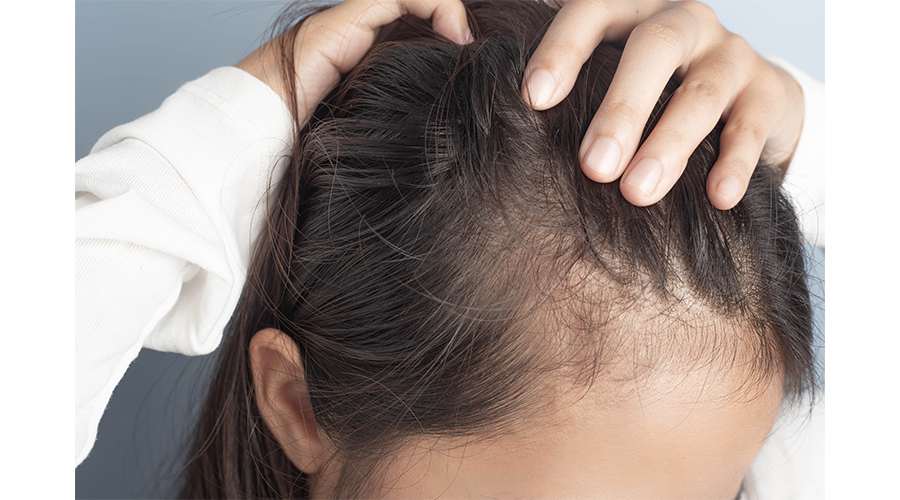Don’t Wig Out Just Yet—Here’s a Guide to Thinning Hair Solutions

By: Kenra Professional
February 2024

When it comes to thinning hair, it’s not just a man’s world. In a culture that overemphasizes the value of a feminine appearance, hair loss can be particularly devastating for women. Whether caused by genetics, hormonal changes, nutritional deficiencies, or environmental factors, thinning hair is common for women and the emotional impact can be significant. Understanding the causes and adopting a holistic approach can empower women to address thinning hair with confidence and celebrate their natural beauty. From nutrition to treatments to haircare products, there’s a wealth of options for women navigating the ups and downs of thinning hair.
Fine Hair Versus Thinning Hair
Let’s be clear: fine hair and thin hair are two different things. Fine hair speaks to the diameter of each individual hair strand, and, people with fine hair actually tend to have a ton of it, which gives them increased density. In contrast, “thin hair” is characterized by a decrease in density or the number of hair follicles or strands per square inch on the scalp. This can lead to visible scalp areas, widening part lines, or an overall reduction of hair density. While it’s challenging to experience this kind of hair loss, with the right care, you can maintain a sense of control while you let your unique charm lead the way.
Let’s Get to the Root of the Issue
Why does hair thin? Your first brush with thinning hair can be unnerving, but understanding causes and conditions can increase your knowledge and ease your mind. Hair loss in women is most often a family affair, thanks to genes that can cause female-pattern hair loss (androgenetic alopecia) as we age. This rarely leads to complete baldness, like it does in men, but it can lead to significant thinning. Other hairy conditions include hormone changes that accompany pregnancy, childbirth or menopause. Health issues like PCOS (polycystic ovary syndrome) or thyroid disorders and specific medicines can also contribute. In today’s busy world, an abundance of stresses can wreak havoc on your tresses. Over-styling and harsh hair treatments can play a role as well.
Just What the Doctor Ordered
Kenra Professional has an unending passion for helping you look and feel your best, but we are not doctors. Seeking guidance from healthcare professionals, particularly dermatologists or trichologists specializing in hair and scalp health, is essential when dealing with thinning hair. These experts can assess your specific condition, identify the underlying causes, and recommend tailored solutions just for you.
Now for the Mane Event
While we may not be able to solve hair loss for good, we can tease out healthy hair practices around nutrition, stress management, treatments and beneficial haircare ingredients that can support your journey to a fuller head of hair.
Nourish and Nurture from Within
A well-balanced diet contains the best ingredients for healthy hair. Although biotin supplements are common knowledge for anyone searching for hair growth solutions, essential nutrients, like vitamins A, C, and E, along with minerals like iron and zinc, also play big roles. To get these vital vitamins into your diet, include a variety of fruits, vegetables, lean proteins, and whole grains. Omega-3 fatty acids, found in fish, flaxseeds, and walnuts, contribute to a healthy scalp, and collagen can help your hair grow. Incorporating stress management techniques like meditation, yoga, or regular exercise can impact your mental health and lead to overall stress reduction that can help you and your hair grow.
Give Love to Your Locks
High-heat styling with curling irons and flat irons, and traction styles like hair extensions and braids that put strain on the hair follicles can significantly influence hair thickness. Avoid harsh chemical treatments and opt for sulfate-free and mild shampoos to prevent further damage. Use a thickening conditioner and get regular trims to eliminate split ends and promote healthier-looking hair. Embrace your natural texture, play with a luxury updo, or go for heatless curls for a confidence-boosting new look.
Try the Latest Medical Treatments
Finally, there are several medically supervised therapies that may be effective. Minoxidil, an over-the-counter topical solution, has been FDA-approved for promoting hair growth and preventing further loss. For those seeking more advanced solutions, Platelet-Rich Plasma (PRP) therapy entails drawing a small blood sample, concentrating platelets, and injecting it into the scalp to stimulate hair follicles. Prescription medications, like finasteride or hormone therapy, may be considered under professional supervision. If you are considering any of these treatments, please consult with your doctor for specialized recommendations.
Growth Is About More Than Just Hair
Thinning hair doesn’t define your worth. Experimenting with different hairstyles, embracing short haircuts, or confidently rocking a natural look can be empowering. Supporting and connecting with others experiencing similar challenges can create a sense of community and understanding. Remember, your beauty is multifaceted and it’s important to celebrate and accept yourself at every stage of life. It’s time to let your inner light shine through just because you’re you.
Reference Articles:
